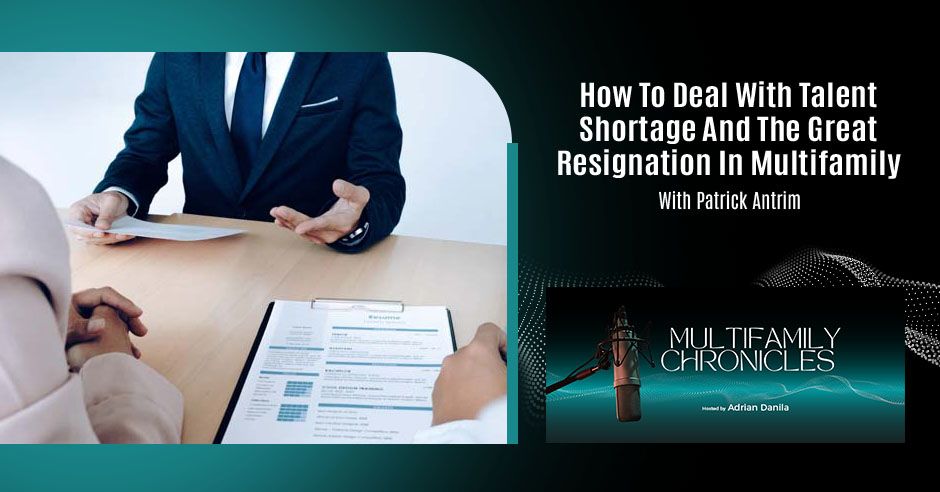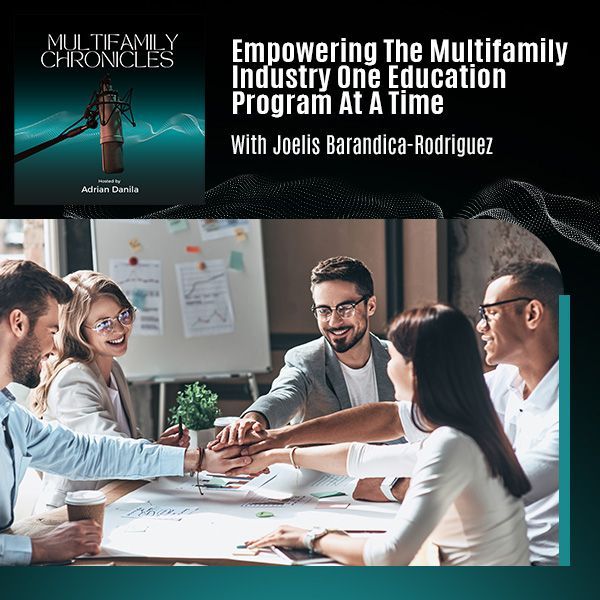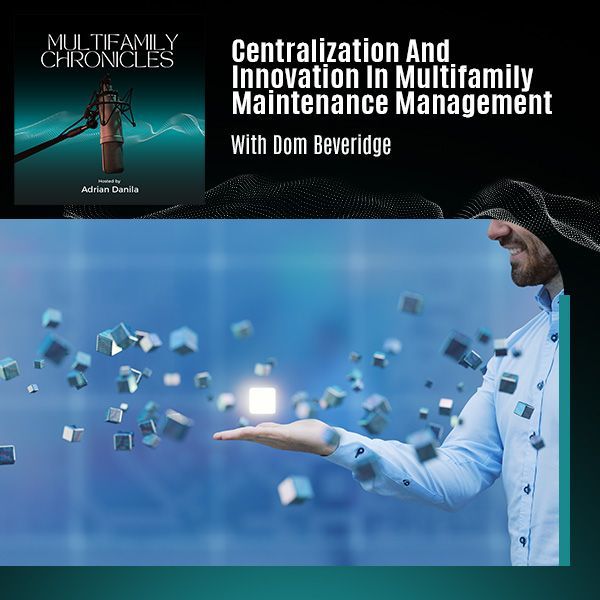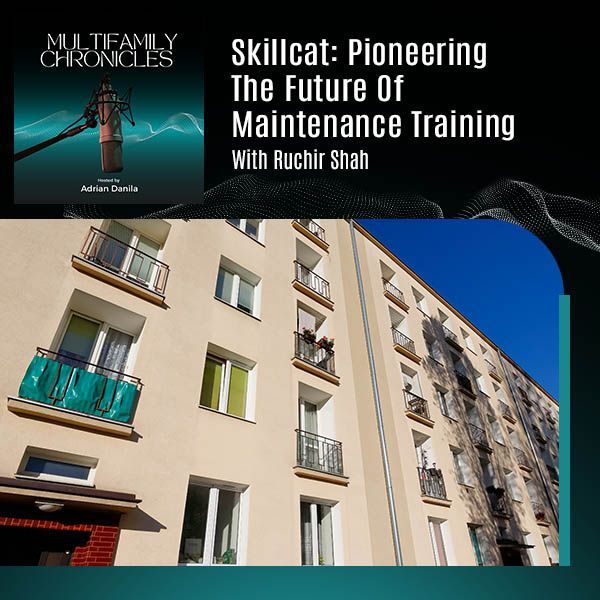How To Deal With Talent Shortage And The Great Resignation In Multifamily With Patrick Antrim
Talent shortage has never been a bigger and harder challenge to address after the Great Resignation. The multifamily industry is one of the spaces where great teams are necessary to achieve success. Getting your desired results would be pretty hard without the right people – or any people at all! In this episode, CEO Multifamily Leadership Patrick Antrim shares all about the business side of recruiting and the best strategies in leveling up your hiring process in an unpredictable market. Patrick also touches on the state of multifamliy market today, investing trends and tips, and more. Find the best candidates out there and make them want to be in your team in this insightful episode. Don’t miss out and tune in now!
---
Watch the episode here
Listen to the episode here
How To Deal With Talent Shortage And The Great Resignation In Multifamily With Patrick Antrim
In this episode, my guest is Patrick Antrim. He is the CEO of Multifamily Leadership. Welcome to the show, Patrick.
It's great to be here and be on the other side of the conversation.
Patrick, for starters, would you please show a little bit about your professional and personal background to the audience?
I got my start in multifamily in a very unique way. I trained early in life as a professional athlete, retired and met the owner of a Major League baseball team. Part of my retirement from playing baseball was I knew I wanted to have a family. I knew I liked California summers and I didn't want to live out of a suitcase. I had my sports agent seek out the type of opportunities I thought I wanted to be involved with.
Some pro athletes had made some moves after their careers and most of those moves were in real estate. He connected me to the owner of a Major League baseball team who had a portfolio of apartments. I became an apprentice to this gentleman who ended up becoming the US Ambassador to Spain and Andorra and did many amazing things around the world of technology and real estate.
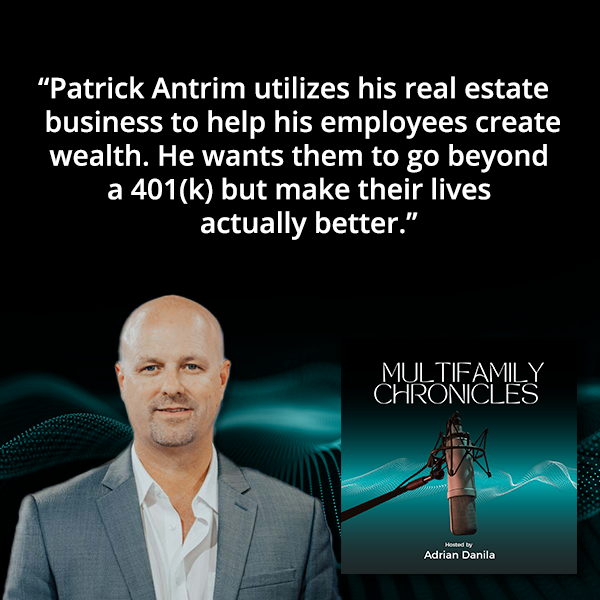
I became his apprentice for eighteen months and learned how to run the business from the top down. What was fascinating about that was what I did with the Yankees as a professional athlete, by having awareness around how they build teams, how they attract talent, how they go out and find the talent. Also, how they develop and invest in the talent and how they protect a culture, not just build a culture but keep it.
Many things haven't changed over many years of that organization. When I came into the real estate portfolio, I used what it took to build championship teams inside real estate companies in multifamily. For me, it was a very unique entry. There was a time when I was 30 seconds away from not even being involved in this industry. I was standing in the recruiting office after being connected here. I looked up and I saw these leasing offices, these images on the wall, their properties and I was like, “I don't want to do that. I didn't retire from the Yankees to do this.”
I left. I got up and the lady came out and she’s like, "Patrick, you're here," in high energy. She brought me into the interview and the rest is history from there. That’s why I'm excited about spending time with you and why I had you on my podcast many years ago. What's fascinating was after I spent eighteen months with this individual that had created more wealth, he is the 700th richest person in the world and he did it through multifamily properties.
I was young in my career and I thought, "I'm going to be the president of this thing. I'm going to run this thing." He set me out to do all the roles in the organization. I scraped curbs, put on the maintenance uniform, collected coins in laundry rooms, auditing, accounting, financial and every aspect of the business. At a time, that was frustrating to me. Many times, I wanted to quit and retire and/or find another job. It was hard to see the bigger picture.
One mentor of mine pulled me aside and said, “You don't focus on what you're seeing here in the activities. You're running an $80 million or $160 million portfolio here.” It allowed me to see things bigger and the rest is knowing that your work has a bigger impact than you may feel it does. The maintenance side of the business and the operations side of the business has a lot of opportunities moving forward as the customers start to relate more to that part of the business. It’s a very interesting entry but that's how I got here.
Your work has a bigger impact than you may feel it does.
How I became part of this media company and owned this platform after about 15 or 18 years of running portfolios all across the country, hiring management companies, acquiring properties and syndicating properties. In every aspect of the investment cycle, I learned that what I was doing was I was finding great people. I was getting them to work effectively together and we were getting them in a position to essentially rent more apartments and grow revenue.
I looked at that as an opportunity. This was a long time ago when we saw an opportunity to solve the talent strategies inside organizations. As an investor looking at third-party operators, I knew that if I hired a third-party management company and I knew their ability to attract the right people and also get them working effectively together so then we could rent faster, lease up faster, take care of the resident and create that experience, then that would be a good leading indicator that's going to be a good decision.
I sat out and we created a research program called Best Places to Work Multifamily. We were recognizing companies for creating healthy organizations from the inside out. We look at eight key areas and that allowed us to do an event. Those events moved into technology, leadership and innovation. My wife and I together run the business and we have a women's summit. That's a journey. I would never have designed it this way but it's more about paying attention to the opportunities that are ahead of us, knowing how to create a solution to the problems that people are having and aligning yourself with great people along the way. It is a very interesting start to multifamily.
It was an amazing journey. Thank you for sharing. There’s one of the things that you said and I picked up on. This is one of the many things I'm passionate about and one of the things that I'm most passionate about is how to find talent. We're looking around and everybody's talking about the Great Resignation or the shortage of talent. On the US report on jobs, there are over two jobs available for each able-bodied person.
We're not even talking about qualified people. We're talking about people that are able to get up and perform any type of work. Each one of them has two opportunities out there waiting for them. How do we overcome this talent shortage? I won't call it a crisis. Some call it a crisis. I see it as a challenge but I also see it as an opportunity to overcome. What is the opportunity to overcome? How do you picture this opportunity to overcome this?
Everyone's looking for a painkiller and they need to be taking vitamins. The problem is that most people that are making decisions about what to do around this problem got their job in a very different way than people who get jobs now. What that means is people have more access. Everybody has a TV in their pocket. People want to work on winning teams. A lot of people focus on happiness and satisfaction.
You can be satisfied somewhere but that doesn't mean you're engaged and winning. If you have another key employee that is seeing somebody else satisfied, doing what they need to do to keep the job and not engaged, that's going to drive a winner away. My point is we are good at marketing properties, not companies. We built a whole strategic team around this. Think of the word talent acquisition for a minute.

When you say recruiting, people see that as a cost. Staffing is a fee, a cost or an expense. You go into the C-Suite and talk about the acquisition and they hold that with the highest value. They say, “If we're going to acquire a $60 million to $80 million asset, we know we have to do some due diligence. We have to think about the future, get the third-party reports together and get the team together. We need to bring in the experts, the right broker and all of these things.” There's a lot of money that goes into acquiring property. They're willing to spend millions of dollars doing this.
Assets and people appreciate as well so people are assets. If they're assets, we needed to align the right type of resources in going after pursuing them. There's a little bit of a shift to this. If there was a feather floating here in the room and I was trying to catch it, the amount of force of my hand trying to catch it would push the feather away. I don't want to oversimplify this but the reality is we were doing some of the things that we should be doing about telling the company story.
Telling who already has joined the organization, what they did within the organization, how they went from here to there and how great it is to work here at this property, get to learn this and do framing walks and construction. They're out by the pool and we have pinball machines and are leasing it. Whatever that is, if we told the story with the same amount of intention as we tell the stories about getting someone to rent an apartment, you wouldn't have the staffing problem.
It's not a fix. It's more about a shift in mindset about how we story tell and get people excited about working there. This happens in startups all the time. They're buying into the dream, the future and changing the world or this app is going to shift this, disrupt that. That's the mindset that we need when we go after these things.
If you want to attract the best talent and people, then you first have to build an organization that they would want to be part of. You could look at this like dating. If you want to find the perfect person, first, figure out who that is and then you have to ask the question, “What would somebody like that want in a partner?” You then become that. It's then a fit and a match.
If you want to attract the best talent and the best people, you first have to build an organization that they would want to be part of.
If you want the best people, then what would the best people want inside that company? If you don't have that, then you're trying to solve the wrong problem. With Best Places to Work Multifamily, some great stories come through. We've been recognizing top companies nationally for a few years or something like that. Some great stories come through that.
It's important to build a great organization. It's hard work. It's not easy. It's easier to sometimes write a check to fix a problem but the reality is if you wanted to solve it, you would think about what the ideal person wants. You may be thinking about it in the maintenance departments. If we ask, “What does an ideal maintenance tech look like?” It can work on call and one that's there for the customer, has the capabilities, loyal or whatever that may be.
You have to ask, “If that's what you want, what would somebody like that want?” Maybe the right salary. You re-envision and repurpose some of the assets and resources going to the leasing office. The money's there to pay them the right amount. The money's there to allow them to participate in investments and create wealth for people. I have a real estate as business as well and oversee properties. I plan to invest, build and develop all these things but the employees that I have will bring on, I want them to create wealth. I don't want them to only get a 401(k). I want their life to get better.
The reason why I say that the two wealthiest people in the world, Elon Musk and Jeff Bezos, have more wealth than anybody in the world. If you think about the multifamily investments that we manage, it's all about protecting and creating wealth. It's an investment. It's a business. If two of the wealthiest people who have achieved the greatest success in the world are thinking like this, then we could learn from it. This is what they think. Jeff Bezos knows that in the future, people want lower costs of things. They will also want them to get things without friction, products, deliveries, drones coming or whatever that may be.
Elon Musk doesn't want the car to be less affordable. He wants to appreciate the value of the car. He wants the customer to pay less for his product. Whereas in multifamily, we're trying to get our customers to pay more for our product or raise the rent. The money is moving all around this business. We need leaders to understand that the money's there. You need to innovate, reallocate or reclassify to create wealth for others.
The residents that move in, their life need to get better. For the employees that come into our organizations, life has to get better for them. If they can't pay their bills, that's not good. That's the goal. When I say the money's moving around, they have limited partner partners. They have all kinds of partners. There's no reason why we can't help our employees become wealthy and guess what happens? They don't have to work there. They choose to work there. That's the difference. It's a mindset shift but a lot is going on there.
I learned so much from what you said. First of all, the analogy with the sports team is part of your background being a professional athlete. I had a guest on a show with whom I spoke a lot about this. Jack Daly speaks about how professional sports teams are outperforming businesses in general because they have this philosophy of always looking for talent.
For them, they're not looking at talent as an event as I'm waiting to have one opening. I'm placing the ad out there and I get applicants. They have 2nd, 3rd, 4th and 5th. All those teams are invested in and people move up. There are hundreds of people that they're recruiting for. They're looking for talent and a professional sports team has 10 or 15 players that play at once based on what sport they're in.
They’re having hundreds of people for fifteen of them. I won't say that maybe it's realistic that multifamily will do that but you should always be recruiting for all the positions, even for the positions that don't even exist. Why am I saying that? I'm saying that because there's a talent that knocks on your door and the bureaucrat in HR will pull this job description and say, “Are they checking the boxes?”
I've seen the talent that kills it with six months of experience and I've seen the talent that has been doing that job for 10 or 15 years that I wouldn't hire if my life depended on it. With the number of years of experience, how is that relevant in the big picture? Also, many other requirements that are in a job description but nobody's questioning. Everybody wants to go down the line, check some boxes and then make the decision if the person is fit for the job or not.
There's so much more than that job description. Another thing that you said, we're thinking in a bureaucratic way and we're in our ideology. What do I know about recruiting? What I know about recruiting is what I know as an individual. I spent hundreds of hours reading comments and posts on Facebook groups that are related to maintenance people from apartment maintenance groups.

I spend hundreds of hours on LinkedIn. I create polls on LinkedIn. I ask people. People might think, “Why are you doing this? It's a waste of time.” No, it's not. When you make a decision based on what you know, it's what one person knows. When you poll and you have 100 or 200 people responding to a poll, it's not a scientific poll but it beats the heck out of one person.
There's so much value in there that's not tapped into. We continue as an industry to embrace the same practices. We're thinking about what worked many years ago. We're applying the same things. We think that's the way things are going to be. They're not. What are you going to do about it? The examples that you give, give your employees the education and the possibility to become wealthy. They're choosing to work there. They don't have to work there because they have bills to pay.
That is the shift in mindset that's going to happen. I know there are companies out there doing that and that's going to win. COVID did many bad things but one of the great things that COVID did for our society is that people are more aware. It increased the awareness of their value and what they're bringing to the table. They're not willing anymore to work to become cheap labor. They're not willing to become laborers at all to work for someone.
The gig economy is real. I travel a lot and speak with Uber drivers all the time. Not a single person, not a single driver told me that they hate what they're doing. They're telling me the opposite. I would not change this for anything in the world. Why? It’s because they work anytime they want. They take time off anytime they want. They don't have a boss to answer to. If they want to work, they flip the switch. They go to work. They make money. When they don't feel like working, they flip the switch back off and go back to their personal life. Realistically speaking, how can we as an industry compete with something like that?
Is it easy? No, it's very complicated. I love the idea that you're bringing on. Educating the employees and giving them skin in the game. You can't tell an employee, “I'm going to pay you $15, $20 or $25 an hour. I want you to have an ownership mentality. You didn't make them an owner. How could you expect that they're going to come to the table with an ownership mentality?” If they don't have a small piece of ownership right there, it's not a realistic expectation. Do you disagree?
I don't disagree. It's an individual decision too. Think about this for a minute. Let me pull back the lens a little bit. We have been very successful in the industry. If you're in multifamily and you haven't been able to make money through the market, then something's wrong. When you mentioned Uber and the driver having maybe nights that they're spending on Uber but they teach a dance class or whatever it is, their lives got better because they were able to pick up additional income, maybe meet some nice people or whatever that may be.

However, Ford, Chevy, Toyota and all the auto manufacturers that invented the car and sell the cars missed the whole opportunity. What I said about Elon Musk not only trying to lower the cost of the car but it increased the value of the car. What if before Ford or before Uber and Lyft, if Ford or Chevy, one of the automakers instead of saying, “This is a $400 car payment. The car is $30,000. This is the financing.” That's an expense.
What if they were able to say, “This car can make you $1,500 or $2,500 a month? We've developed this app that allows you to make money from your backseat and we created this marketplace for you.” They missed the whole thing. The ideas that are going to be what's next are not going to come from the people in the circle. Most people in multifamily follow what somebody else did because it's safe. Nothing disruptive is going to come from inside like that. Just the automakers, we have to think about how to improve our lives. We've been successful. We can look at other industries on how things disrupted and shifted things for bigger and better futures.
Most people that are working within this industry are employees. They may have some ownership in some deals and stuff like that but they're risk-averse. In other words, they have a single flow of income. They are careful about their decisions and it's safe. It's like the old quote, “Nobody got fired by going with IBM,” back in the day. There are a lot of safety conversations around that. When you do that, nothing transformative happens.
If I'm in the spot and I'm a maintenance technician or I'm a manager or regional vice president, whatever that is and I'll go back to the analogy with sports, it's not only the sports team's job. The players, the people or the employees have to give it everything that they've got. If they want everything out of life, then they go to work. That's how they get paid but it's their job to create their world and outcome, not their employers.
It's my opinion that in the off time, they're learning about what it means to own and operate a property, an investment. They need to get all in on their career and the opportunities are there for those people that do that. I'm one of them. It's not enough just to say, “I want $20 an hour, $25 or $27 and that's what I deserve.” Thinking linear, you're thinking small. You need to be thinking, “I'm getting paid to learn how to create wealth for me and my family.”
If I'm a maintenance technician, you observe those things, then you could buy your apartments and do things the way you want to do. However, the reality is you're getting paid to learn how to create wealth for others. If you pay attention, there are lovely people in this industry willing to share with you what to do next, mentor you and all that kind of stuff.

I would say that if you're not making the money you want to make, even in maintenance, leasing or wherever that is, you got to learn how to negotiate better. You need to come to the table with more value. You need to do the things that are required to get to the next level. In professional sports, people were out partying in college and I wasn't. I was in the gym. I was eating. I was saying no to things. If you want everything out of life, you got to say no to some things and get involved.
That's the essence. I want to charge people with that. It's not a company problem. Companies are like, “We can't find people.” Number one, you're not doing the recruiting, the job or the marketing. The job ads are from HR, which are written like compliance-related stuff. They're boring. They're not compelling and they're all about what your company wants. There is nothing about what somebody will do when they get the job.
It's not a job ad. It's a job description and that's very different. You don't say in an apartment ad, “This is the tile and the carpeting.” Facts are not enough. The employers and the recruiters still believe that they're the ones choosing. Think about the dynamics in an employer interview. They think they're the ones choosing. The candidates are choosing and the employers haven't figured it out yet.
Very few did and they're going to win. For the rest, it is going to be a very painful experience and they're going to learn through unable pain at times. They're going to maybe at times stop and throw some money at it, throw some more money at it and see that throwing money at it didn't solve it. Hopefully, eventually, we'll get around to understanding what the deal is. The tables have turned. It is the candidate who is choosing way more than the employer choosing. Every single applicant, especially site level, is like a maintenance technician. What did you say you have?
TV, radio and computer.
It has more technology than Ronald Reagan had back in the day.
Let's focus on the maintenance side of things. People say they can't find maintenance technicians. I know a group that is doing a great job finding maintenance technicians and they're using our software to do it. The reason why is we're using text messaging. Even if it's a job fair and things like that, they have the communication tool on their phone.
However, they may not be at a desk like a person recruiting is seeing life through the world they live but not thinking like the people that are capable of taking care of the real estate are mobile out doing work. They could be up on a roof or wherever and that's where you need to reach them. They do have mobile phones. Text messaging has been amazing in finding and communicating to a channel the customer wants or the prospective candidate wants to be communicated.

That's why this is the most powerful thing. The other thing is a frictionless process. You mentioned Bezos and that he understands that he needs to eliminate friction. Indeed understands that as well. They created a one-click apply option. You could preload your resume, go to the search box, search maintenance technician or service director and pick your location. Everything that comes up on that search as a search result only depends on how fast you are.
If you could do 10 clicks a minute, you could apply for 10 jobs in 1 minute on that list and you could go down that list pages. You could do hundreds of applications in a matter of minutes. On the employer side, somebody's receiving that application and resume. It becomes very interesting what's happening. What's the response time? I tell them the shelf life of a resume of a maintenance person is six hours max if you get lucky. If you don't make contact within 6 hours and I'll say 2 to 3 hours, somebody else will. If you're going to be the 5th or the 6th person who makes contact, typically a candidate is not going to go through CC interviews to make up their mind.
Adrian, let me tell you this. The people that are hunting for jobs and need jobs are on Indeed. Yes, they've made that frictionless. If you go to an employer job site, there are 35 questions. What's my investment here to do all this even though the employers have trained the marketplace that they will not follow up? They don't know what's going to happen when they click the button Apply because out of 30 applications that they may submit, the employers won't get back to them. It trains the marketplace to not enjoy that experience.
Back to professional sports, they don't have a job fair. It's an extreme analogy but they go find the talent. What you want to do is make the content that you're producing out there in the world know that this is a company that's doing great things. We're taking care of the employees and customers from the inside out. We are winning financially. You could win too. We also have some fun while we're doing it.
You'll be challenged and it's a great culture and all that stuff. The next application coming in is going to be somebody that finds you on LinkedIn and is like, “I've been following you. It looks like you acquired a new property in Texas. I'm here. I would love to see what you are working on. I have a perspective. I can see inside the company already and I haven't even chosen to work there.”
That person's winning somewhere else. They have a job and that's what I meant. There are people in professional sports. I'll pick on basketball and let's say somebody wants to be on the Celtics or the Lakers. They have to win for the Phoenix Suns first. You have to win where you are. Typically, in the job boards, there are some scenarios that they've got going on but the best type of candidates are the ones that are winning where they are and something drew them to a bigger and better future because of the fit that you have displayed in advance. They're just reaching out. They may not even have a resume updated. Those are the people that are going to shift your organization and that is very different from putting lines in the water and waiting for people to bite.
This is something that brings me back to professional sports and the scouting departments. I want to touch on this and get your take on it. I've been saying this for a while. Companies create scouting departments. People that are scouting for talent. All they do is like, “We have three positions up and up.” They are scouting or looking for talent. They are making contact with the greatest talent in the industry and creating this report. When that person is ready to make a move, they'll be the first person to contact you. You create that. Do you find any value in creating scaling departments in property management companies? Do you think there's any value in that?
Everyone is a recruiter in the organization. Everybody, as they go out into the world, when they recognize talent and they know what the goals of the organization are, they make introductions. That's the way it should work. It's not something you do at scale. It's something that you do internally. You could be growing so fast that you have to do certain things a different way.
I did a course and I'd love to have you come in and do something as well in this course. We did a course on a complete turnkey talent acquisition system for multifamily. It's essentially everything from building the brand to acquiring the customer, all of that stuff. It's at MultifamilyTalentStrategy.com. I'd love for you to come in and do a segment on that. We have a thing in that section called Everyone Is A Recruiter. It's specifically about scouting or finding people who are winning and matched to the goals of your organization.
I would love for you to do something in there because we're bringing in the best places to work, people that are getting these results already. We're trying to extract their knowledge so everybody can benefit. It's like anything else. You're trying to find a customer and employees are customers. You have to get them excited. You have to show them what it's going to be like when they work there, whom they get to work with, what they get to work on, where they get to work on it, why it's important to the world that they're living in, what's different and all of that stuff.
I love to be part of the project to check it out and see if I could be of any value to you. There’s one other thing I want to ask and get your take on. Another thing that I've been saying for a while is companies should hire industry influencers, people who are very well-known in the industry. They have a presence and a personal brand that's very well-known. What that's going to do to them is naturally attract some of the people in their circle in their network. For the most part, they're going to be the same great-quality people. Is that a good strategy? Is there any value in what I said?
The word influencer can get tricky because we're all trying to figure out what that looks like but the concept has been around forever, which is to get people talking about the thing you're working on in a way that's positive and they've received some result themselves through. Through that, it's more authentic to attract the type of people you want to spend time with.
The word “influencer” can get tricky because everyone is still trying to figure out what that looks like.
For example, I sell a lot of iPhones probably because I talk about them. Tesla did this. Tesla does not market or advertise. Their customers do. They've enabled and activated their customers to become their sales team. When a maintenance technician comes in, why is that resident not saying, “What an amazing experience that was like?” All of a sudden, somebody sees that and is like, “I could work indoors instead of on rooftops.”
That resident can activate it. Employees can activate and then you can get strategic and reach outside through marketing and do some things. You mentioned influencers and stuff like that, that's useful. You got to be consistent. It's not anything you start and stop. Back in the day, there was a time when people were selling, “You need a website,” and now nobody would ever say, “We're going to try that for a little bit. If it doesn't work in six months, we'll take it down.” This whole strategy is here to stay. You got to figure out how to equip people with the tools.
In my course that we're going to have you come inside on, what we talk about is most people don't know how to share things. If you've got 600 employees, you have 600 recruiters. Why doesn't the marketing team give those employees or make it easy for them to amplify messages? You have to enable them not just with one influencer handling one thing for everybody.
It's the strategy allowing the people within it, both residents and employees to the right messages. Create the graphics and messages and say, “These are things you can share.” When people go to events, I'm speaking and exhibiting. People support what they invest in. If they invest in their company and they invest in their job, they will support it. You got to make it easy for them to do that.
The first piece is that you got to get away. You got to make them feel like this is the type of organization that I want my friends to be a part of. I want to bring them on. If that piece doesn't exist, all the marketing and tools available are worth nothing because people only go to the motions, “Why would I bring a friend? Why would I advertise for this company that I don't even like?”
There's a lot to that question and that's more strategic on the operations side. There's a mindset that my employer is my fate, when I get promoted, what I make and all of those things. The reality is through leadership, you get them to understand that they create their world together and people will support what they help build.
The reality is through leadership. You get people to understand and create their world right together with the company.
When you look at what we're doing, for years, I've been meeting privately every Friday as part of a multifamily innovation advisory council. We've gathered about 1.6 million units inside this council. We will be three million units by the end of 2023. We're doing what's called community-led content and events. We meet annually at the Multifamily Innovation Summit and that's where we also recognize Best Places to Work Multifamily.
What's fascinating is it's not, “Here's an event. Here's who's sponsored. Come see this. This is what's happening because people wrote checks to be part of it.” What we're doing is we're involving the operators, the owners and they're telling us, “These are the challenges we have. This is what we're facing. This is what we want to do. These are the bigger opportunities we want to create.”
With that, we have that intel. We're creating content at our Innovation Summit and through our podcasts and everything that we do that either knocks down a problem or makes life better for people. When they're involved in supporting it, designing it and contributing to it, they will support and invest in it more. It is the same thing with software development with beta testing, launching products and getting your customers involved. In some way, they feel like they're part of designing what they're able to consume. It works the same way in employer brands.
It's been an amazing conversation, Patrick. Due to the typical interest for someone, I'll say that we're about to wrap it up right here. I would love to continue and do a second series. I have a list of topics I wanted to talk to you about. We haven't touched them. As soon as you started talking about talent, the whole thing clicked for me. I'm so passionate about it and there's so much to discuss on this alone. I would love to have you for a 2nd or 3rd episode.
I agree. This is an ongoing conversation and you are doing a great job with your show. We want to support you. We launched the Multifamily Podcast Network. We're going to see your show there. You will have it in there and you'll impact more people and more conversations like this. I love what you're doing. We need more people to do what you're doing. We are letting people see the value that you're creating in the world and through that, a lot of big things will happen.
Patrick, I want to thank you for taking the time. I'm grateful. It was an amazing conversation. I truly enjoyed it. I hope to get you back here so we could talk about the other topics. Probably have enough for at least 2 or 3 more shows. I hope that you could make the time and you'll be interested so we could continue this series of conversations. There's so much value that you're bringing to the audience. It is very educational. You have an amazing story besides that and that is important. Someone with a story and a background like you with the things that you have accomplished and you have to share is so much in value. I thank you. I appreciate it. I hope to have you back here soon.
I appreciate being part of it. Thank you so much.
Everybody, thank you very much for reading. I hope to see you back here soon. Have a great time.
Important Links
- Multifamily Leadership
- Best Places to Work Multifamily
- Jack Daly – Previous Episode
- MultifamilyTalentStrategy.com
- Multifamily Innovation Summit
- Multifamily Podcast Network
- https://YouTu.be/pB_e-KKmCNE


